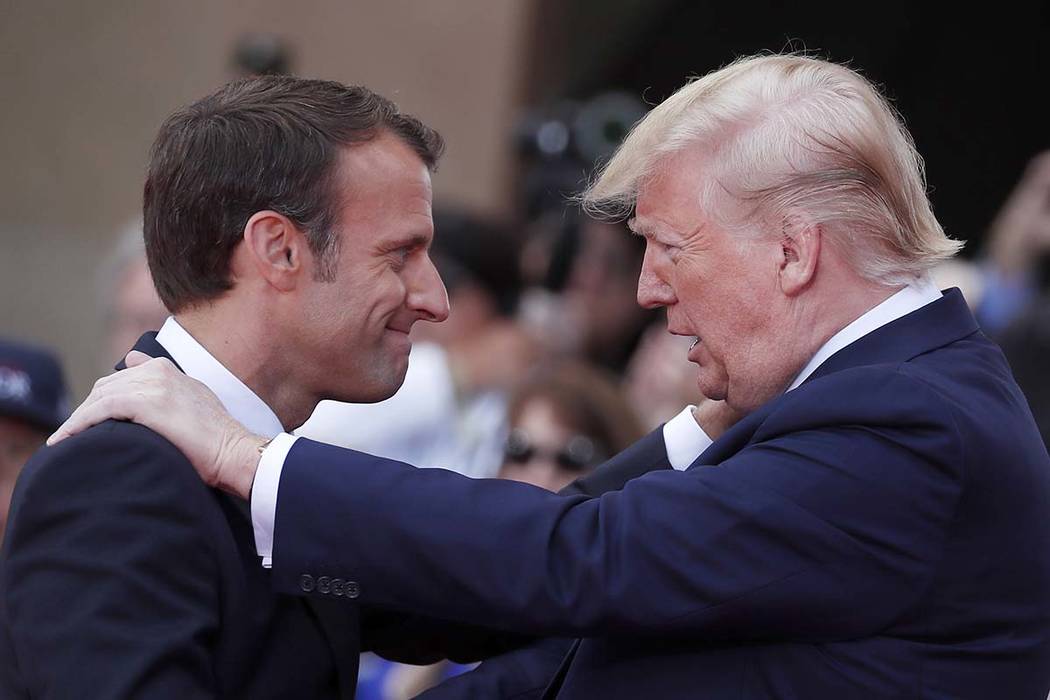Trump does sharp about-face, praises NATO, slams Macron
LONDON — In a sharp role reversal, President Donald Trump became NATO’s biggest booster Tuesday, ready to mow down anyone who challenged the alliance, as he slammed French President Emmanuel Macron for uttering a “very, very nasty statement” about the alliance.
In an interview published in “The Economist” last month, Macron said that Turkey’s incursion into Syria and Trump’s greenlighting of the attack demonstrated that NATO is experiencing “brain death” – a remark that put many NATO leaders on edge.
As a candidate Trump dismissed NATO as “obsolete.” When he attended his first NATO summit in 2017, the newly minted president scolded member nations for not paying their “fair share” on defense and was slow to explicitly endorse Article 5, the provision that considers an attack on one member to be an attack on all.
But as Trump sat next to NATO Secretary General Jens Stoltenberg at the beginning of the summit that marks NATO’s 70th anniversary, the American president hailed the alliance for its moves to make other nations pay more on defense and predicted “a tremendous couple of days.” Both leaders lavished praise on the other.
Trump repeated Turkish President Recep Tayyip Erodgan’s riposte that Macron himself is “brain dead.”
Trump’s clear umbrage at Macron’s sound bite signaled that perhaps the “bromance” between the two leaders that began with a white-knuckled handshake but grew into mutual statements of admiration from their respective capitals, is on the rocks.
France is “starting to tax other people’s products,” Trump said of France’s new Digital Services Tax – also known as “GAFA” (for Google, Apple, Facebook, Amazon) tax. While Trump said he is “not necessarily in love with those companies,” he threatened to raise tariffs on French wine and other goods as payback.
After the meeting with Stoltenberg, Trump attended a 2020 fundraiser at the Intercontinental London Park Lane hotel that’s expected to raise $3 million, according to Axios.
When Macron and Trump met for a bilateral talk in the afternoon, Trump started remarks before reporters with a more conciliatory tone as he talked about their trade dispute. “We have a minor dispute, I think we will probably be able to work it out,” Trump told reporters.
For his part, Macron questioned Turkey’s bona fides as a NATO ally as he railed against Turkey’s decision to buy Russia’s S400 anti-aircraft missile system and summed up Turkey’s invasion into Syria as a choice to fight “against those who fight with us.”
“This is really why we’re having meetings, those are points, and we’ll be discussing that with the president,” Trump responded.
“Trump is being very statesmanlike,” Niles Gardiner of the Heritage Foundation’s Margaret Thatcher Center for Freedom told the Review-Journal. “He is emerging as the biggest defender of the NATO alliance on the world stage.”
Gardiner acknowledged Trump’s “love-hate relationship” with NATO, but sees Trump’s push to drive member nations to spend more on defense as a needed wake-up call for the alliance that has made the organization stronger.
During a meeting with Canadian Prime Minister Justin Trudeau, Trump described Canada’s NATO spending as “slightly delinquent,” even as he slammed Germany for not spending enough on defense. But Canada is expected to spend 1.27 percent of its GDP on defense this year, less than Germany’s 1.36 percent. Both countries have fallen far short of NATO’s 2-percent guideline.
Members of the British press were watching for signs of a cooling in the buddy-movie relationship between Trump and the conservative Prime Minister Boris Johnson, who has asked the American president not to insinuate himself into Great Britain’s Dec. 12 election.
The White House has announced no bilateral meeting between Trump and Johnson, but the two leaders will attend the same events and are expected to talk.
Gardiner, a dual British-American citizen, thinks that any prime minister would discourage a U.S. president from inserting himself in a British campaign. “British governments are traditionally sensitive to any intervention from foreign leaders,” he said.
For the most part, Trump stayed in his own lane. When a reporter asked Trump if he has any thoughts on the election, Trump responded, “I have no thoughts on it.” Trump also said, “I think Boris is very capable, and I think he’ll do a good job.”
Asked if he could work with Labor Leader Jeremy Corbyn, Trump responded that he could work with anyone.
Trump also disputed Corbyn’s call to exclude the government-run National Health Service from trade talks with the United States, saying that the U.S. isn’t interested in the program and wouldn’t take it “on a silver platter.”
But U.S. Ambassador to the United Kingdom Woody Johnson told the BBC that Washington would seek access to the National Health Service as part of a post-Brexit trade deal. In June, Trump backed up Johnson when he said, “When you’re dealing in trade, everything is on the table.”
The Stop Trump coalition organized a march from Trafalgar Square to Buckingham Palace for a reception with Queen Elizabeth and Prince Charles to protest Trump’s presence in London. Participants carried signs that said, “Trump Hands Off Our NHS.”
But Trump saved his indignation for House Democrats whom he called “unpatriotic” for moving toward impeachment while he is at NATO.
The president and first lady had tea with Prince Charles and his wife Camilla before they arrived at Buckingham Palace. Later the Trumps pulled up at No. 10 Downing Street with Macron and Italian Prime Minister Giuseppe Conte in tow after they hitched a ride in the president’s customized Cadillac limousine, nicknamed the Beast.
Wednesday the action moves to The Grove, a luxury golf resort and hotel outside of London, where NATO leaders will shake hands, pose for the “family photo” and participate in a plenary session. In the afternoon, Trump will hold a press conference.
Contact Debra J. Saunders at dsaunders@reviewjournal.com or 202-662-7391. Follow @DebraJSaunders on Twitter.



















